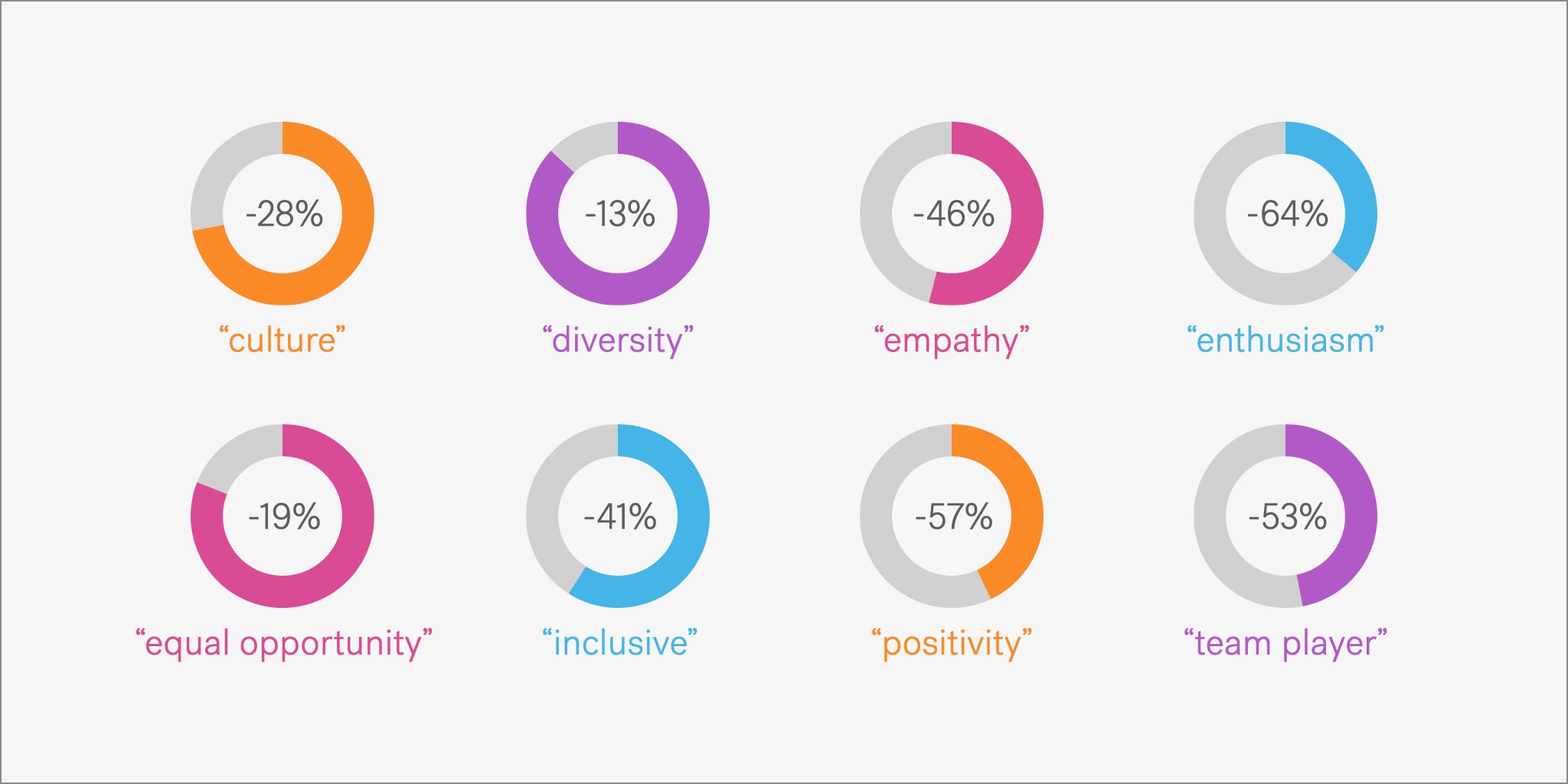Hiring language points to unequal economic recovery

The job market has changed dramatically, and suddenly in the past four months. A pandemic swept the globe, putting whole economies and industries on pause, and in some cases, in reverse. The unemployment rate in the United States was at a 50-year low of 3.5% in February before spiking to 14.7% in May, the highest it’s been since 1940.
The job loss numbers are staggering and, even worse, the layoffs are disproportionately affecting women and people of color. A report from the Department of Labor revealed that while the unemployment rate for whites reached around 14.2% in April, that number was 16.7% among African Americans, 18.9% among Latinos, and 15.5% among women. Now, as there have been some signs that layoffs are slowing, early indicators suggest that we may be heading for an uneven recovery—the decrease in job losses is mostly being driven by decreases in job losses for white men, not women and people of color.

One of the causes of an economic recovery that advantages white men over other groups could be a shift in what companies emphasize in their recruitment marketing. Textio’s analysis of job posts before and after the job losses suggest that some qualities of an inclusive workplace are already disappearing in hiring language data.
Language patterns marking inclusive cultures drop from hiring language after pandemic
To look at specific language changes that are occurring in the aftermath of the onset of the pandemic, Textio analyzed the usage patterns of top phrases in just under 100,000 job posts from February through May, before and after the onset of the pandemic in the U.S.

There have been declines in both diversity and equal opportunity, two principals directly related to the makeup of your workforce. These drops are modest, which is to be expected; these are typically found in equal employment opportunity (EEO) statements which are part of many job post templates and less likely to change. More striking are the declines in words typically mentioned to show that inclusion is a central company value.
An inclusive environment that fosters belonging is built on all individuals being valued, treated fairly, and given equal opportunity and access to resources, so that they can fully contribute to the company’s success. It is also built by creating mutual respect, understanding, and compassion for others’ experiences. According to The Conversation, research shows that social support and understanding are part of alleviating stress and adjusting work-life expectations. Without them, extreme stress can result, and quality of work suffers. With the phrases empathy and inclusive both decreasing, aspects of inclusive environments are not being emphasized in (and maybe even undermining) company culture following the health crisis. Tellingly, even culture itself has declining usage in hiring materials.
As we look towards the recovery, companies need to make sure they continue to expand and strengthen the inclusive cultures they have built. This starts with putting your culture at the forefront of your hiring, otherwise it will get lost within the company. Abandoning these values and culture doesn’t just have an impact on hiring, but also retention.
This crisis has had a personal effect on us all. It is hard to connect in meaningful ways with friends and coworkers. Feelings of isolation are coupled with increased anxiety and uncertainty. With layoffs affecting women and people of color disproportionately, these stresses are magnified in these groups. Creating environment that highlights positivity and enthusiasm, while emphasizing the value of each person to contribute and be a team player can help foster belonging. Studies have shown this isn’t just good for employee engagement, but also companies with positive cultures are more productive. Despite this, these words are all declining in the language data.
A look back – diversity and inclusion before the pandemic
While these numbers are discouraging, placing them in historical context only amplifies the change. An unequal recovery threatens to undo the progress that has been made by companies that have made a commitment (and investment) to making diversity, equity, and inclusion central to their culture. Textio analyzed global public job listings posted January 2018 - January 2020, identifying how often the words diversity and inclusion show up. Textio saw a steady increase in how often these words were being used prior to the pandemic, showing a commitment to including this in their cultures.

The data reflects that the industry has keyed in on the importance of inclusivity and belonging, in addition to simply hiring more diversity. In Q1 of 2018, inclusion was used in just over 1% of job posts. Fast forward to Q4 of 2019, and it appears in over 5% of jobs—that is a 340% increase. The exponential growth of inclusion mirrors the industry’s focus on moving beyond diversity and into a place where folks with differing backgrounds are not just hired, but listened to and valued equally.
Prioritizing culture even in tough economic environments
Over the past years, many companies have purposely elevated their unique and inclusive cultures—and for good reason. According to Glassdoor, 77% of job seekers consider a company’s culture before applying and 73% won’t apply unless the company’s values align with their own. Companies have invested in programs, hired employer brand professionals, and changed their language to better reflect their cultures. However, with a change in the economy and job market following the pandemic, these advances are being threatened.
Increasing diversity and creating inclusive environments where everyone feels welcome and safe to contribute is not something that happens naturally; companies need to work to achieve it. In a tough economic environment, companies must still prioritize a commitment to this work, or they risk going backwards, erasing gains, and contributing to an unequal recovery.